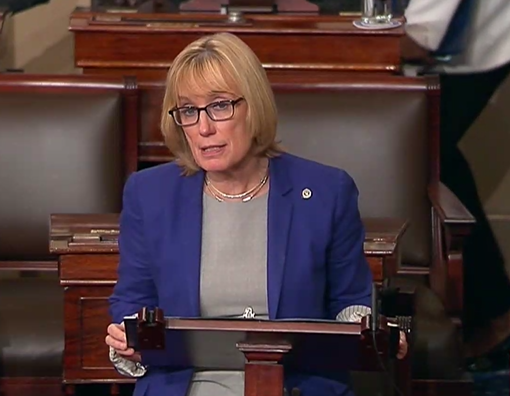U.S. Sen. Maggie Hassan is on the fence over an anti-trust bill targeting Big Tech as critics claim it would hurt consumers without solving any serious problems.
The American Innovation and Choice Online Act (AICOA), sponsored by Sens. Amy Klobuchar (D-Minn.) and Chuck Grassley (R-Iowa), has been touted as an attempt to level the playing field between major tech firms like Amazon, Google, and Facebook and smaller businesses who rely on those platforms. It would prevent them from giving preferential treatment to their own products and services on their platforms.
“As dominant digital platforms–some of the biggest companies our world has ever seen–increasingly give preference to their own products and services, we must put policies in place to ensure small businesses and entrepreneurs still have the opportunity to succeed in the digital marketplace,” Klobuchar said when she introduced the legislation last year.
Opponents of the bill worry about unintended consequences that would increase prices for consumers and add to inflation. For example, it could force Amazon to shut down the Prime free shipping program or bring an end to the popular Google Docs application.
During a podcast interview with NHJournal, Doug Kelly with the group American Edge said the bill “turns 50 years of antitrust policy upside down” and reverses America’s pro-consumer approach to regulation.
“America has always been about competition, and our antitrust standard has always been ‘how does this impact the consumer overall?’ But these new bills [like the AICOA] focus instead on ‘how do we protect specific competitors in this process?’
“Our current pro-consumer standard works. It’s led to the U.S. being number one in innovation and has let to an amazing standard of living. It’s forced innovation to happen faster because these companies — even the biggest technology companies — face competition.”
And Lindsay Mark Lewis, executive director of the left-leaning Progressive Policy Institute (PPI) said, “The antitrust legislation sponsored by Sen. Klobuchar will do more harm than good to American families who rely on digital shopping, commerce, and communication every day. If passed, this bill would weaken America’s ability to compete with China and undercut what has been robust job creation in the high-growth tech and e-commerce industries.”
Nevertheless, Washington Democrats, joined by a handful of Republicans like Grassley, Sen. Lindsey Graham (R-S.C.), and Sen. Josh Hawley (R-Mo.), are pressing ahead with plan to pass the legislation this summer. They point to a recent poll taken across the four battleground states of Arizona, Georgia, New Hampshire. and Nevada which found 76 percent of voters in those states said they favor the AICOA.
Klobuchar and Co. will need 60 votes to bring the bill to the floor and then, thanks to Vice President Kamala Harris’s tie-breaking power, 50 votes to pass it.
But according to multiple media reports, one key vote may be in doubt: Hassan’s.
“On a caucus-wide call held with Democratic chiefs of staff last week, Marc Goldberg, chief of staff to Sen. Maggie Hassan (D-N.H.), was among a handful of senior aides who raised objections,” Politico reports. “Goldberg cited the tech antitrust bill as an example of a potentially controversial vote that senators shouldn’t be forced to take just months out from the midterms.”
If Hassan does break with her fellow Democrats, it would be greeted as good news by the U.S. Chamber of Commerce, among others. “This legislation would irreparably harm the American economy and innovation. It fails to address bipartisan concerns that it would undermine our national security, cybersecurity, privacy, and international competitiveness—and harm consumers,” the Chamber’s Executive Vice President and Chief Policy Officer Neil Bradley said in a statement.
“Such an approach will fuel further inflation, limit choices, and undermine investment in innovation by injecting regulatory uncertainty into the marketplace at the worst possible time.”
Meanwhile, said Kelly, small businesses could be impacted negatively by the AICOA, too.
“In New Hampshire, there are 137 small businesses that employ half the people in the state. Each of these businesses uses some piece of technology — whether it’s a Facebook website, whether it’s Amazon for shipping delivery and products or Google for searches and ad placement — they all use these things. They are incredible values for these people to be able to find new customers, find new markets, and then move product.
“Bills like the AICOA will increase the cost for these small businesses who are the backbone of our economy,” Kelly said.
Hassan declined to comment for this story.


